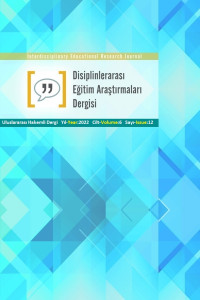Öz
Araştırmanın amacı ortaokul öğretmenlerinin disiplinlerarası yaklaşıma yönelik görüşlerini belirlemektir. Bu çalışmada nitel araştırma yöntemlerinden durum çalışması deseni kullanılmıştır. Araştırmanın katılımcıları farklı şehir ve okullarda görev yapan on matematik, sekiz fen bilimleri, yedi Türkçe, yedi sosyal bilgiler, dört İngilizce, altı din kültürü ve ahlak bilgisi öğretmeni olmak üzere toplam 42 öğretmenden oluşmaktadır. Katılımcılar, ölçüt örnekleme yöntemi ile seçilmiş olup göz önünde bulundurulan ölçütler, katılımcıların matematik, fen bilimleri, Türkçe, sosyal bilgiler, İngilizce ve din kültürü ana dallarında ve devlet okulunda görev yapmalarıdır. Verilerin toplanmasında yarı yapılandırılmış görüşme formu kullanılmıştır. Elde edilen verilerin analizinde içerik analizi yaklaşımı kullanılmıştır. Yapılan analizler sonucunda öğretmenlerin “disiplinlerarası yaklaşım”, “ders kapsamında diğer derslerle disiplinlerarası ilişkiler”, “disiplinlerarası yaklaşımın yararları ve sınırlılıkları” ile “öneriler” temaları altında görüş belirttikleri sonucuna ulaşılmıştır. Bu doğrultuda mevcut uygulama ve gelecek araştırmalara yönelik öneriler geliştirilmiştir.
Anahtar Kelimeler
Kaynakça
- Akçal, Z., & Beşoluk, Ş. (2021). Fen eğitiminde disiplinlerarası yönelimlerin STEM’e evrilmesi sürecine tarihsel bir bakış. Cumhuriyet Uluslararası Eğitim Dergisi, 10(2), 556-578.
- Aydın, G., & Balım, A. G. (2005). An interdisciplinary application based on constructivist approach: Teaching of energy topics. Ankara University Journal of Faculty of Educational Sciences (JFES), 38(2), 145-166.
- Demirel, Ö., Tuncel, İ., Demirhan, C., & Demir, K. (2008). Çoklu Zeka Kuramı ile Disiplinlerarası Yaklaşımı Temel Alan Uygulamalara İlişkin Öğretmen-Öğrenci Görüşleri. Eğitim ve Bilim, 33(17), 14-24.
- Dinç, N. D.; & Karahan, Ç. (2021). Sanat entegrasyonöntemi: Fen bilimleri ve görsel sanatlar dersi örneği. Akademik Sosyal Araştırmalar Dergisi,9(115), 259-279.
- Güder, Y., & Gürbüz, R. (2018). Interdisciplinary mathematical modeling activities as a transitional tool for stem education: Teacher and student opinions. Adıyaman Üniversitesi Eğitim Bilimleri Dergisi, 8, 170-198.
- Kanatlı, F., & Çekici, Y. (2013). Türkçe öğretiminde disiplinler arası olanaklar. Mersin Üniversitesi Eğitim Fakültesi Dergisi, 9(2), 223-234.
- Karakuş, M., Türkkan, B. T., & Karakuş, F. (2017). Fen bilgisi ve ilköğretim matematik öğretmenlerinin disiplinlerarası yaklaşıma yönelik görüşlerinin belirlenmesi. Ilkogretim Online, 16(2), 509-524.
- Martinello, M. L., & Cook, G. E. (2000). Interdisciplinary inquiry in teaching and learning. Merrill, an imprint of Prentice Hall, Order Processing Center, PO Box 11071, Des Moines, IA 50336-1071.
- MEB, (2018). Ortaokul Matematik Öğretim Programı, Ankara.
- Merriam, S. B. (1998). Qualitative research and case study applications in education.San Francisco: Josse-Bass.
- Özkök, A. (2005). Disiplinler arası yaklaşıma dayalıyaratıcı problem çözme öğretim programının yaratıcı problem çözme becerisine etkisi. Hacettepe üniversitesi eğitim fakültesi dergisi, 28(28), 159-167.
- Turan, S. (2019). 2018 Sosyal bilgiler öğretim programının disiplinlerarası yapısının incelenmesi. Journal of Innovative Research in Social Studies, 2(2), 166-190.
- Turna, Ö., & Bolat, M. (2015). Eğitimde disiplinlerarası yaklaşımın kullanıldığı tezlerin analizi. Ondokuz Mayıs Üniversitesi Eğitim Fakültesi Dergisi, 34(1), 35-55.
- Yıldırım, A. (1996). Disiplinlerarası öğretim kavramı ve programlar açısından doğurduğu sonuçlar. Hacettepe Üniversitesi Eğitim Fakültesi Dergisi, 12(12), 89-94.
- Yıldırım, A., & Şimşek, H. (2016). Sosyal bilimlerde nitel araştırma yöntemleri (10. bs.). Ankara: Seçkin Yayıncılık.
Ayrıntılar
| Birincil Dil | Türkçe |
|---|---|
| Konular | Eğitim Üzerine Çalışmalar |
| Bölüm | Eğitim Bilimleri |
| Yazarlar | |
| Yayımlanma Tarihi | 30 Ağustos 2022 |
| Gönderilme Tarihi | 21 Mart 2022 |
| Kabul Tarihi | 22 Temmuz 2022 |
| Yayımlandığı Sayı | Yıl 2022 Cilt: 6 Sayı: 12 |
The Aim of The Journal
The Journal of Interdisciplinary Educational Researches (JIER) published by the Interdisciplinary Educational and Research Association (JIER)A) is an internationally eminent journal.
JIER, a nonprofit, nonprofit NGO, is concerned with improving the education system within the context of its corporate objectives and social responsibility policies. JIER, has the potential to solve educational problems and has a strong gratification for the contributions of qualified scientific researchers.
JIER has the purpose of serving the construction of an education system that can win the knowledge and skills that each individual should have firstly in our country and then in the world. In addition, JIER serves to disseminate the academic work that contributes to the professional development of teachers and academicians, offering concrete solutions to the problems of all levels of education, from preschool education to higher education.
JIER has the priority to contribute to more qualified school practices. Creating and managing content within this context will help to advance towards the goal of being a "focus magazine" and "magazine school", and will also form the basis for a holistic view of educational issues. It also acts as an intermediary in the production of common mind for sustainable development and education


